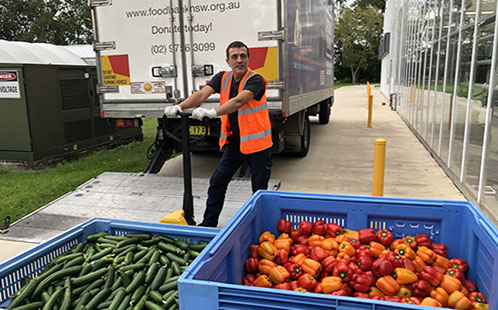
Western Sydney University and its research partners are leading the way when it comes to donating tonnes of fresh, healthy produce to Foodbank NSW and ACT to support families in need – more important than ever, as the COVID-19 crisis continues to impact communities and another winter season fast approaches.
Since its launch in 2017 as a world-class education and research facility for Australia’s protected cropping specialists, the National Vegetable Protected Cropping Centre’s Glasshouse at the University’s Hawkesbury campus has produced a stunning quantity of more than 58 tonnes of fresh produce, such as eggplants, cucumbers and chilies from production and research trials.
The fresh produce grown in the glasshouse as part of trials into glasshouse horticulture optimisation, has proven to be a source of fresh, clean and highly-nutritious produce. Once it has been analysed, weighed and cleaned, the produce is in an ideal condition for donating to Foodbank NSW and ACT.
This is yet another way in which Western Sydney University is supporting the Greater Western Sydney community and creating impact through its research and innovation, according to scientist at the National Vegetable Protected Cropping Centre, according to Professor Zhonghua Chen.
“The NVPCC glasshouse delivers high-quality research outcomes that improve Australia’s ability to produce food crops in advanced protected cropping systems,” said Professor Chen.
Current research includes trials of smart glass films that could save on glasshouse cooling costs, indoor pollination of crops using native stingless bees, and variety trials of eggplants, cucumbers and melons that could improve regional food production options,” said Professor Chen.
Glasshouse production is so prolific that Foodbank NSW and ACT take deliveries of several full crates each week during peak harvest times. The produce is harvested, weighed and sampled with non-destructive measures, and sorted into bulk crates. Within a day, this produce is then distributed out to families across western Sydney through the Foodbank distribution services.
Foodbank NSW and ACT Chief Executive Officer Gerry Andersen OAM says “demand had increased massively by almost 50 per cent and yet 25 per cent of the food coming into our warehouses had dropped because demand is so great in the supermarkets.”
“This means that the productive capability of Western Sydney University’s experimental glasshouse trials is of even greater benefit to us given the extraordinary effects of rising unemployment, the effects of summer’s fires and droughts on food prices, and the impacts from COVID-19 on home food consumption,” says Mr Andersen.








